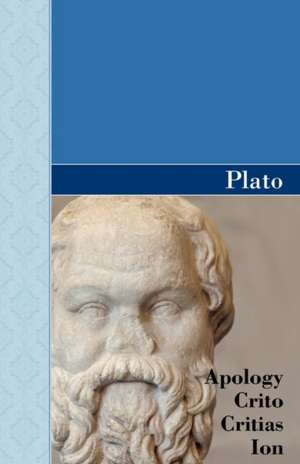Apology, Crito, Critias and Ion Dialogues of Plato: Volume 1766
Autor Platoen Limba Engleză Paperback – 11 noi 2009
| Toate formatele și edițiile | Preț | Express |
|---|---|---|
| Paperback (1) | 83.58 lei 43-57 zile | |
| Akasha Classics – 11 noi 2009 | 83.58 lei 43-57 zile | |
| Hardback (1) | 165.72 lei 43-57 zile | |
| Akasha Classics – 11 noi 2009 | 165.72 lei 43-57 zile |
Preț: 83.58 lei
Nou
Puncte Express: 125
Preț estimativ în valută:
15.99€ • 16.60$ • 13.37£
15.99€ • 16.60$ • 13.37£
Carte tipărită la comandă
Livrare economică 17-31 martie
Preluare comenzi: 021 569.72.76
Specificații
ISBN-13: 9781605125435
ISBN-10: 1605125431
Pagini: 122
Dimensiuni: 140 x 216 x 7 mm
Greutate: 0.16 kg
Editura: Akasha Classics
ISBN-10: 1605125431
Pagini: 122
Dimensiuni: 140 x 216 x 7 mm
Greutate: 0.16 kg
Editura: Akasha Classics
Notă biografică
Plato was an ancient Greek philosopher born in Athens during the Classical period in Ancient Greece. In Athens, Plato founded the Academy, a philosophical school where he taught the philosophical doctrines that would later become known as Platonism. Plato (or Platon) was a pen name derived, apparently, from the nickname given to him by his wrestling coach - allegedly a reference to his physical broadness. According to Alexander of Miletus quoted by Diogenes of Sinope his actual name was Aristocles, son of Ariston, of the deme Collytus (Collytus being a district of Athens).Plato was an innovator of the written dialogue and dialectic forms in philosophy. He raised problems for what later became all the major areas of both theoretical philosophy and practical philosophy. His most famous contribution is the Theory of forms, which has been interpreted as advancing a solution to what is now known as the problem of universals. He is also the namesake of Platonic love and the Platonic solids.













